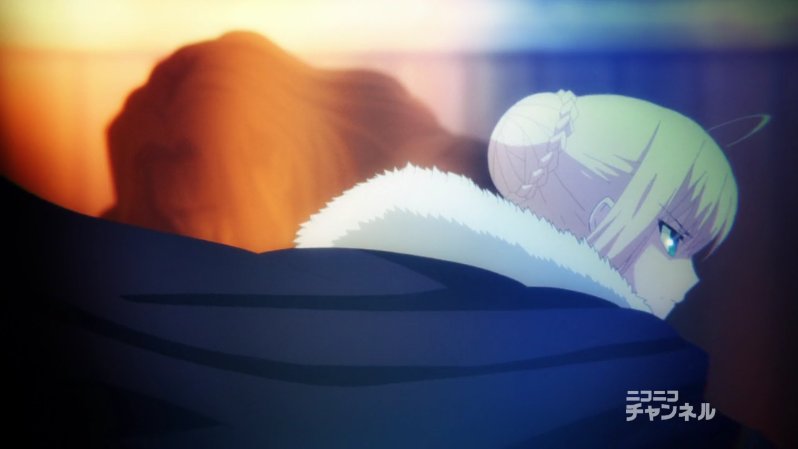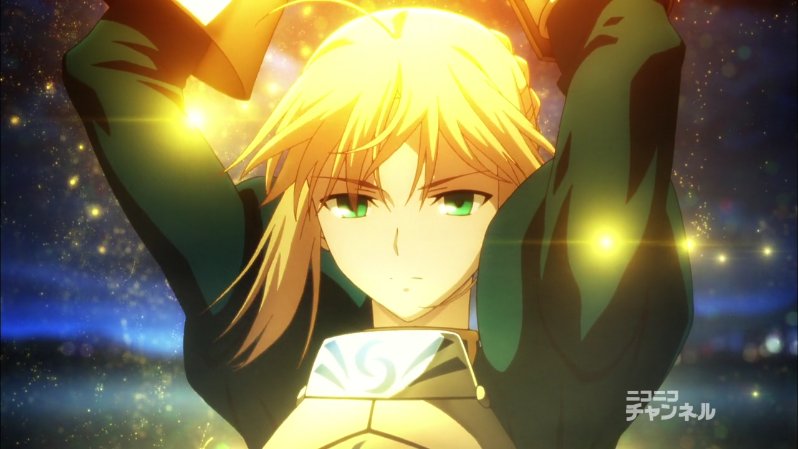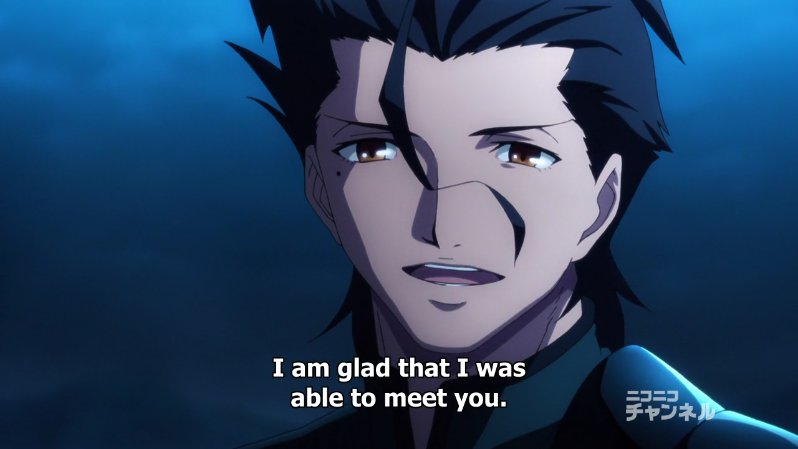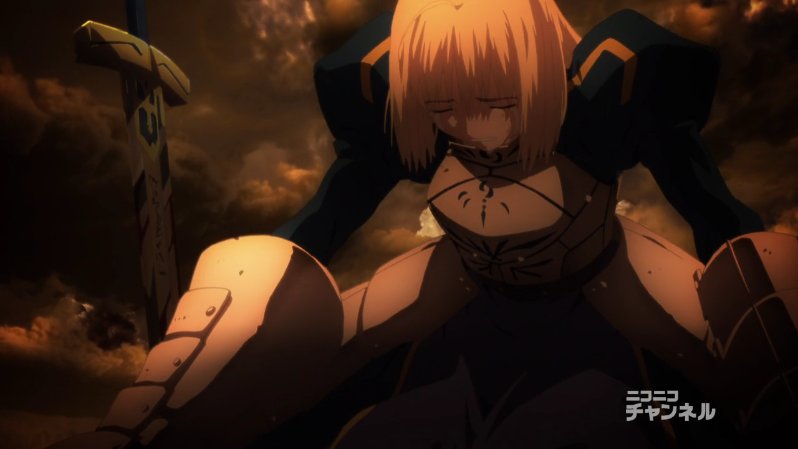
I finished Fate/Zero some time ago and enjoyed it immensely. It was a very dense show with a lot of rich, inter-weaving ideas – so much so that a detailed treatment is probably an impossibility for a single post. But I still want to write a little on it, in part also to hopefully build some momentum for tackling more difficult post topics later on. So I’m going to focus this post on Saber – a single thread in Fate/Zero’s yarn, but one that is I think quite wonderful and radiant. Hopefully I’ll also be able to pivot on that to say some general things about Fate/Zero itself – the kind of show it is like.

Now I didn’t like Saber very much in Fate/Stay Night (at least in the anime incarnation thereof). I didn’t think she was very interesting – nor for that matter endearing or even less than annoying. However my impression of her is very different in Fate/Zero. A lot of good writing went into the shoring up of her character’s history, motivations and philosophy, so that her obnoxious sanctimoniousness is blunted by the beautiful tragedy around which her character is woven – her singular loyalty to the ideal. The rather than an ideal because, even in Fate/Zero’s multifaceted world, I thought that the kind of virtue that Saber stood and strove for distinguishes itself on its purity. Or perhaps one could say, rather than wielding virtue in the pursuit of some objective or end, she pursued and sought to embody virtue itself. Saber was King of Knights not so much in the sense that she was a great leader of Knights but that she was the embodiment of the knightly ideal.

The meeting of the three Kings was a great moment in the show. It is also a great example of a very nice feature of Fate/Zero that made it unlike shows like Kara no Kyoukai: Fate/Zero brimmed with complex, often philosophical, contrasting ideas, but they are rarely of the sort that is silent and hidden in the folds of subtlety and implication. Its characters speak its ideas and argue them openly, and the relationship between the plot and the show’s themes tends to be oratorical and obvious rather than enigmatic. And so it is that in this scene we could sit with the Kings and chew on their words and contemplate their kingliness, argued out loud. However, Fate/Zero is I think nonetheless not without subtlety. Here, the meeting concludes apparently to the detriment of Saber’s kingliness, however
 “You were the greatest amongst the kings. All who served you… believed thus.”
“You were the greatest amongst the kings. All who served you… believed thus.”
We are given an obvious counter-perspective at a climatic moment near the chaotic end of the series, where Berserker, revealed to be Lancelot, Arturia’s trusted knight whom she apparently failed, called her the greatest among Kings. Strewn across the series are also other powerful indications of her greatness, perhaps none more spectacular than the first casting of Excalibur. Ufotable’s presentation was breathtaking, with fiery music, immaculate production, and Irisviel’s awed whisper hailing the shining noble phantasm as the embodiment of the dying dreams of loyal warriors of all ages, wielded by the undefeated King that led and championed them, the undefeated king in whom their salvation rested.

Fate/Zero did not only employ fireworks and grandeur in crafting this portrayal of Saber. I thought the relationship between Saber and Lancer dripped with meaning. In all of the seemingly unending tribulation and sorrow of Lancer’s time as a servant, Saber – even as his enemy – seemed his one sliver of happiness. Lancer, a virtuous and loyal warrior constantly let down by circumstance and by his master – exactly, one would imagine, the kind of warrior whose tragic dream would fit Irisviel’s poetic narration – found solace and vindication in Saber’s unfailing honor and chivalry. I thought this gave substance to Fate/Zero’s beautiful description of the Excalibur. Even as a servant Saber was naturally a deliverer of the virtuous. And this was what truly made her King of Knights.

Now we venture into the realm of tragedy. In her perfection and her virtuousness, Saber was clearly not spared the painful witnessing of events unjust, disastrous and sorrowful: beginning with the destruction of Britain in life, to the terrible death of Lancer and her eventual discovery of Lancelot’s madness during her servanthood. And this appeared to manifest as some form of regret in Saber. Virtue naturally seeks justice, the salvation and triumph of the good, but even in her kingly perfection Saber was unable to bring this to fruition. The revelation that her cold perfection and single-minded devotion to righteousness distanced her from the humanity of her subjects, and facilitated Lancelot’s fall from grace, shattered her. It was a palpable fall – the despairing clarity that reveals that your best wasn’t enough. The culmination of her character. In this sense her journey and the motivations and emotions that led her towards the Grail were very much like her master’s. She forges on, carrying the will of the fallen – those she was unable to save, Lancer and Lancelot included – as her pride, in the desperate hope that she could still somehow make right what her perfect virtue could not. Somehow bring atonement and salvation to the souls and wills she had taken as her burden, and in so doing also bring herself the same.
More so than physical appearance, I think this was what really lead Caster to mistake Saber for Joan of Arc – the light and burden of virtue, the single-minded pursuit of God, though God forsook her.
 Great scene: Saber, standing over her fallen comrade, alone and victorious in her righteousness, as the land burned around her
Great scene: Saber, standing over her fallen comrade, alone and victorious in her righteousness, as the land burned around her
And at the horizon of it all – the Grail. Saber’s last hope. Perhaps her despairing desperation for a miracle that could bring her and her charges closure – succeed where she had failed and achieve the impossible – was a partial reason she was one of the closest to obtaining the Grail. I won’t go into detail regarding how it all ended, but with the miracle eventually out of reach and that hope extinguished, Saber’s story in Fate/Zero ended with her heart-rending cry back on the shattered battlefield of Camlann. Her final broken whisper that she should not have been King was perhaps her final despairing acknowledgement that her burden was, after all, impossible for her.

I should hasten to add here in footnote that all the many players in the Fourth Holy Grail War – masters and servants alike, have their own powerful motivations, based on philosophies often unique to each, for seeking the Grail. While Saber’s is undoubtedly one of the most compelling, even the “minor” characters – if they can indeed be so called – have their cases and perspectives argued to satisfying levels of depth. A great joy of watching the series has been to witness the ringing clashes of wills knowing that, though neither is clearly morally superior, neither can afford to back down without compromising the ideals that they stood for. Perhaps the best and most fitting takeaway from the entire experience is this: let me never take as evil, foolish, or inferior the person that stands against me in my seeking of what I see as noble. Earnest men, perhaps in their own ways good, can nonetheless meet on opposite sides of the field.

Leave a Reply